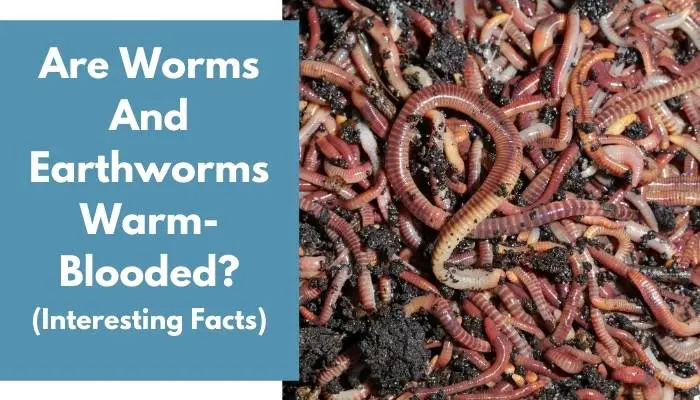Worms and earthworms are tiny creatures and are often ignored by most people. But don’t you want to know if worms and earthworms are cold or warm-blooded? We will find out.
So are worms and earthworms warm-blooded? The answer would be no. Worms and earthworms are cold-blooded.
If we say that animals or species are cold-blooded, they cannot regulate their internal body temperature. They cannot adapt to the change in the environment. Therefore, these animals cannot survive in extreme hot and extreme cold temperatures.
Those who are growing worms must know-how maintain the temperature where they placed their worms to survive. If the temperature of where you put your worms will increase or decrease and go beyond their average temperature, the worms can die.
The worms will decrease eating activity, and they will not survive the change of temperature. On the other hand, warm-blooded animals are capable of maintaining their body temperature regardless of their temperature.
If you wish to know a lot more about worms, earthworms, and their temperature, stay for a very informative read.
Contents
Are Worms And Earthworms Cold Blooded Or Warm-Blooded?
A warm-blooded animal can adapt to the environment’s temperature and regulate its body temperature. A cold-blooded animal adapts to the change of the environment’s temperature. Worms and earthworms belong to cold-blooded animals.
This means that worms and earthworms cannot regulate their body temperature. These worms and earthworms will not be able to adapt to the change in the environment’s temperature.
Therefore, if there will be a change in the temperature and it is way beyond their average temperature, these worms and earthworms can die. Worms usually have their average temperature between thirteen to twenty-nine degrees Celsius.
Any temperature outside this can cause your worms to die. Since worms and earthworms are cold-blooded, they cannot control their temperature just like how mammals can.
With this, worms and earthworms need to stay in a place where it is safe for their body temperature. High temperatures will increase the metabolism of these worms and earthworms, and they will feed more because of that.
Related Articles:
Do Worms Have Blood In Them?
Yes. Worms do have blood. Many people do not know this because if you kill a worm by cutting it, you cannot find red blood in there.
This means that the color of some worms is not red. The blood of worms and earthworms can sometimes be pink, colorless, or even green. To know what color of blood a worm has, you have to know what kind of worm you are talking about.
There are so many types of worms in the world. Generally speaking, a worm is an elongated, tiny animal that moves oddly. So there are three types of worms.
The first type is the flatworms. These worms are parasite worms and include tapeworms. These worms are so flat that you would almost think they do not have blood.
These worms absorb oxygen using their skin. In return, these worms have blood that is color white or colorless. There are also roundworms.
They live on soil. The last is the segmented worms. So yes, worms and earthworms have blood, and the color depends on what kind of worm you are talking about.
The color of the blood of these worms and earthworms will depend on the molecules that carry oxygen inside and out of their body. This is the reason why some worms and earthworms have different colors of their blood.
You might have killed a worm sometimes and wonder why they have no blood. But they do have blood. It is just that it is not the same color humans have.
Why Are Worms And Earthworms Cold-Blooded?
The reason why an animal or a species is cold-blooded is not transparent to experts. Experts have not found out the reason why a particular animal is cold-blooded. All they know is to identify if an animal is cold-blooded and what that means.
We know now that worms are cold-blooded, and they can die if their temperature will go way too hot and way too cold. Extreme temperatures are not healthy and conducive for these worms and earthworms to live.
In winter, worms and earthworms need to burrow down deep to protect themselves from the super cold weather. If the temperature is also too hot, they will not survive that also. The climate they were in should be between their average body temperatures.
In this case, the worms and earthworms live at average temperatures. This can also be why they burrow deep in the soil, aside from the fact that they feed in decaying plants and animals.
Summary
In summary, worms and earthworms are warm-blooded. This means that worms and earthworms cannot regulate their body temperature.
They also cannot adapt to the change in the environment’s temperature. As a result, extreme temperatures are not conducive for worms and earthworms to live.



